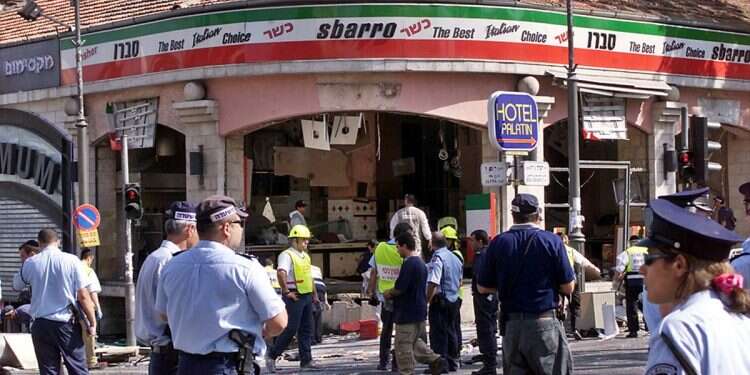In a precedent-setting decision, the Jerusalem District Court has ordered the Palestinian Authority to pay approximately 46 million shekel ($12.3 million) in compensation to three siblings whose family members were killed in the 2001 Sbarro restaurant bombing in Jerusalem. The ruling marks the first implementation of a new Israeli law mandating punitive damages for terror victims.
Sixteen people were killed in the Sbarro attack, including five members of the Schijveschuurder family: Mordechai, 43; Tzira, 41; Ra'aya, 14; Yitzhak, 4; and Hemda, 2 (two parents and three minors). Two other daughters were injured in the attack. Three brothers who were not with the family at the time identified the bodies.
Judge Arnon Darel split the proceedings, addressing the murder of the three siblings first. The remaining matters pending before the court concern the murder of the two parents and the personal damages suffered by three surviving siblings who experienced severe psychological trauma.

While Israel's Supreme Court had previously established the Palestinian Authority's responsibility for terror attacks, it initiated about two years ago a Supreme Court ruling, which determined its responsibility for terror attacks even when it was not the initiating party, due to payments made to families of terrorists. However, the majority opinion rejected the argument that it should pay punitive damages for its "pay-to-slay" policy.
In March 2024, the Knesset reversed this position by legislating that any entity rewarding terror would pay $2.7 million in punitive damages for each person killed and $1.35 million in punitive damages for each person injured. No rulings have been issued based on this law until now, and the Palestinian Authority has argued that it is unconstitutional and void.
The plaintiffs were represented by attorneys Dr. Asaf Posner, Nathaniel Posner, and Gilad Lesser from the Dr. Asaf Posner law firm. For the first time, Jerusalem District Court Judge Arnon Darel is implementing the law and requiring the Palestinian Authority to pay $2.7 million for each victim. Additionally, Judge Darel ordered the Palestinian Authority to pay for "classic" damages, including pain and suffering, shortened life expectancy, and lost wages during the lost years, amounting to an additional $5.4 million, plus attorney fees and expenses.

Following the current lawsuit, attachment orders were issued several months ago, freezing funds that Israel holds for the Palestinian Authority. The plaintiffs' attorneys have approached state authorities demanding immediate transfer of the money to the plaintiffs, whose case has been pending in court for over 20 years.
According to the compensation law, beyond direct collection from the Palestinian Authority, damages can only be collected from funds that Israel has frozen under law due to the Palestinian Authority's payments to terrorists' families. Regular tort damages can be collected, beyond direct collection from the Palestinian Authority, from any amount held by the state, including ongoing payments transferred by Israel to the Palestinian Authority from tax revenues it collects on its behalf.
Dr. Asaf Posner noted this was a first step, welcoming the court's application of the Knesset's legislation meant to exact a significant price from the Palestinian Authority for rewarding acts of terror. He expressed hope that now, with an explicit law in place, terror victims would receive swift justice going forward.




